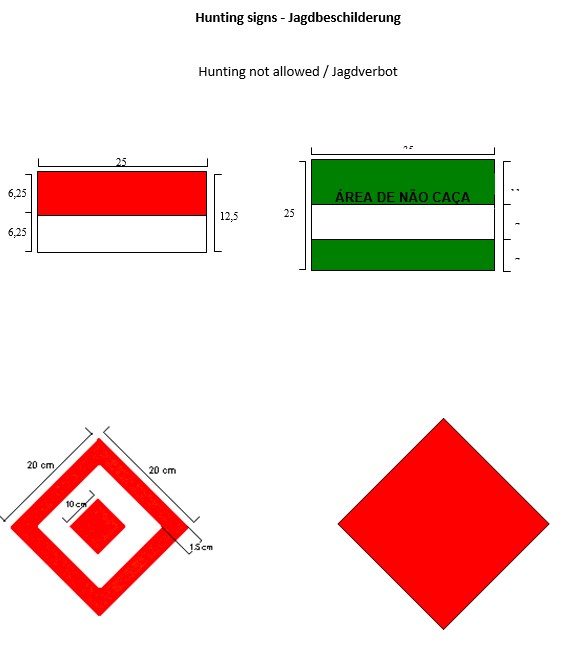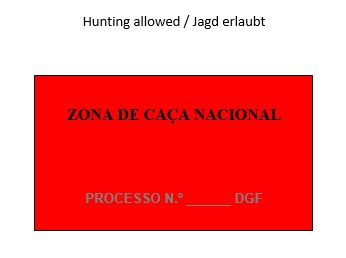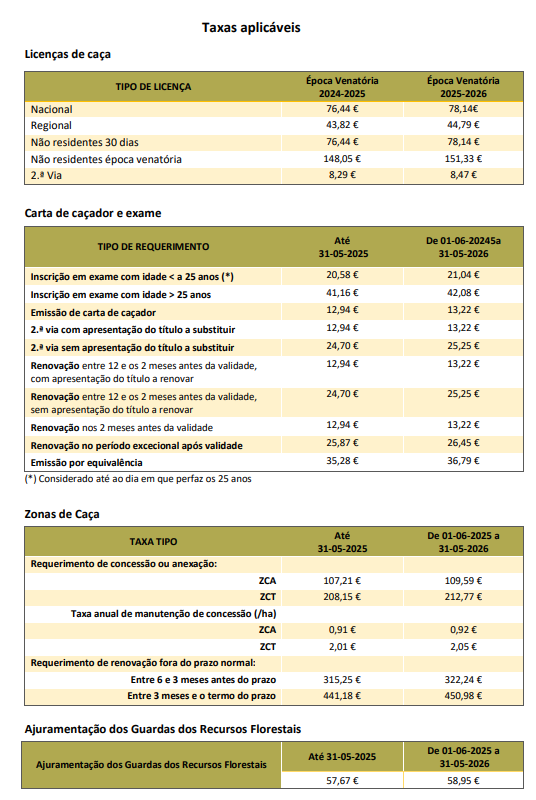
FS05E - Hunting
Category : Fact Sheets
FS05E - Hunting
It is only possible to obtain a Hunting Licence for the following Hunting Season, from May 15th of each year. Between the 15th and the 31st of May of each year, it is necessary to select the Season for which you intend to get your licence:
the current season that ends on May 31
or the next season that starts on the 1st of June
Under the terms of Ordinance No. 67/2024, of February 22, Hunting Licences authorise hunting of all game species and are of the following types:
National Licence - allows hunting, without prejudice to other limitations imposed by law, throughout the National Territory, during a Hunting Season.
Regional Licence - allows hunting in the respective Hunting Region, during a Hunting Season.
Licence for Non-Residents in National Territory - allows hunting, without prejudice to other limitations imposed by law, throughout the National Territory, for 30 days or during a Hunting Season.
The National Licence and the Regional License can be obtained:
In the MULTIBANCO (MB) ATM network (by including Carta de Caçador number and your NIF)
At the ICNF office
The Licence for Non-Residents in National Territory can only be obtained:
At an ICNF branch
From an Organisation of the Hunting Sector (OSC) authorised for the purpose
Soon it will be possible online via the ICNF website
The 2nd copy of a hunting license can be obtained:
Through the MB, during the 60 days following the issuance (if originally done via MB) of the respective licence
At the ICNF office
Soon it will be possible online via the ICNF website
Regardless of the licencing having been carried out through Multibanco or ICNF, it is possible to obtain, from the latter, proof of ownership of a Hunting Licence.
Municipal Hunting Zones (Zona de Caça Municipal): To find out where hunting is allowed in your area, you should contact your local Câmara Municipal or the Instituto da Conservação da Natureza e das Florestas (ICNF) (contact details at the end of this fact sheet), or visit your Junta de Freguesia, where there may also be plans to view. You will then be able to establish where the nearest hunting zones to your property are and whether in fact your land or property is within an established zone.
If your property is in a Zona de Caça Municipal: If you wish to remove the right to hunt, you must write a letter to the local hunting association or club informing them of the situation, the same letter should be sent to ICNF. It is important that you get the “Nr. Processo” from the Zona de Caça Municipal signs, these signs should be posted all around the perimeter of the hunting area. The local Junta de Freguesia should also be able to help you with the contact to the local hunting association/club.
Otherwise: You must contact the GNR in Faro or Portimão and speak to ICNF; they will then deal with the complaint. You can also just go to your local GNR and they will contact ICNF on your behalf. Make sure you always take note of where you phoned/visited, day and time and WHO you spoke to.
Protected Areas (hunting not allowed)
Even in areas designated for hunting, it clearly states in the law that hunting is NOT allowed within:
100 metres of highways, national roads (EN) and railway tracks
250 metres of garden walls, barns, roads and houses
500 metres of Beaches; Schools; Hospitals; Prisons; Orphanages; Retirement homes; Military Installations; Nursing Homes (kindergarten); Electric facilities; Lighthouses; River Harbours; Airports; Tourist complexes; Camp sites; Sports halls; Industrial Complexes and Animal Shelters.
Signs
If you own a large property and wish to keep hunters off your land completely, then you can apply for a licence to put “no hunting” signs on the borders of your land, it is not necessary to put signs 250 meters from the house because that is already clearly forbidden according to the law. You must fill in an application (requerimento) at the office of the ICNF, they have an office in Portimão and in Faro. Please bring following documents.
- Map size 1/25.000 (If you do not have it, you can get it at your local Câmara Municipal for a small fee, it must be with boundaries of the property shown “delimitação prédio”)
- Valid “Certidão de Teor” (complete property description certificate) which can be obtained from your local Conservatória de Registo Predial
- Photocopy of your Passport or Residência and Fiscal number
- Caderneta Predial with “Planta Cadastral” (Registered Map)
Generally, it will take from 3-6 months to get the licence if all papers are in order and when you do get the licence it will have a number which has to show on the signs. The signs are described in the law and can be done at a local Blacksmith; the ICNF will be able to help you find one that is familiar with the signs.
In the case that your “no hunting” signs or the 100/250/500 meters distance is not respected by the hunters, then the way to place a complaint depends on the following:
If your property is in a “Zona de Caça Municipal” (municipal hunting area): You must write a letter/email to the local hunting association or club informing them of the situation, the same letter should be sent to ICNF. It is important that you get the “Nr. Processo” from the Zona de Caça Municipal signs, these signs should be posted all around the perimeter of the hunting area. If you do not know whether your property is within a Zona de Caça Municipal, then you can investigate either in the local Junta de Freguesia or at the ICNF (maps of municipal hunting areas are only kept in ICNF but the Junta de Freguesia might know). The local Junta de Freguesia should also be able to help you with the contact to the local hunting association/club.
Otherwise: You must contact the GNR in Faro or Portimão and speak to ICNF, they will then deal with the complaint. You can also just go to your local GNR and they will contact ICNF on your behalf. Make sure you always take note of where you phoned/visited, day and time and WHO you spoke to.
IMPORTANT: A special unit has been formed within the GNR, which is Serviço de Protecção Ambiental e Natureza, so you cannot report your complaints with the ICNF. HOWEVER, if you do not have any help from the Serviço de Protecção Ambiental e Natureza/GNR, in other words if the GNR does not show up or do not take your complaint seriously, then you can indeed inform ICNF.
If you would like to have further information about hunting dates and what animals are hunted within those dates, in the Zona Caça Municipal in your area, then you can go to your local Junta de Freguesia. On their board they must have an “EDITAL” (Plano Anual de Exploração), which will give you detailed information.
Lastly please find below some useful contacts and if you have any further questions, please contact the afpop office.
GNR Portimão, Tel: 282 420 750
GNR Faro, Tel: 289 887 600
ICNF Tel: 213 507 900
The Institute for Forestry and Nature Conservation – ICNF has the obligation to promote and ensure the management and management of hunting, ensuring the supervision and compliance with current legislation and developing actions, so that this resource can continue to be used. With criteria that make hunting an instrument of conservation of the fauna and not of its destruction.
See below the calendar for the year of 2025-2026:
1. Rabbit
- In ordered hunting grounds: from 1st September to 31st December;
- In unordered hunting grounds: from 1st Sunday of October to last Sunday of November;
2. Hare
- In ordered hunting grounds: from 1st September to 31st December.
- In unordered hunting grounds: from the first Sunday of October to the last Sunday of November;
(The hare hunting, correcting and cetraria, begins on 1st September and ends on 28th February)
3. Fox
- In ordered hunting grounds: from 1st October to the last day of February;
- In unordered hunting grounds: from first Sunday of October to last Sunday of December;
4. Herpestee ichnenmon (“Saca-Rabos”)
- In ordered hunting grounds: from 1st October to February last;
- In unordered hunting grounds: from first Sunday of October to last Sunday of December;
5. Red Partridge
- In orderly hunting grounds: from 1st October to 31st January;
- In unordered hunting grounds: from first Sunday of October to last Sunday of December;
6. Pheasant
- In orderly hunting grounds: from 1st October to 31st January;
7. Rock-Pigeon
- In orderly hunting grounds: from third Sunday of August to 31st of December;
- In unordered hunting grounds: from the first Sunday of October to the last Sunday of December;
(Hunting for these species is only allowed in the municipalities of Alijó, Carrazeda de Ansiães, Freixo de Espada à Cinta, Macedo de Cavaleiros, Mogadouro, Moncorvo, Miranda do Douro, Mirandela, Vila Nova de Foz Côa, Sesimbra, Setúbal, Palmela, Caldas da Rainha, Peniche, Lourinhã, Torres Vedras, Mafra, Sintra, Cascais, Odemira, Aljezur, Vila do Bispo, Lagos, Lagoa, Portimão, Silves, Funchal, Santa Cruz, Machico, Porto Santo, Santana, São Vicente, Porto Moniz , Calheta, Ponta do Sol, Ribeira Brava and Câmara de Lobos)
8. “Pega-rabuda”
- In orderly hunting grounds: from the third Sunday of August to the last day of February;
- In unordered hunting grounds: from first Sunday of October to last Sunday of December;
9. Carrion Crow (“Gralha-preta”)
- In ordered hunting grounds: from the third Sunday of August to the last day of February;
- In unordered hunting grounds: from first Sunday of October to last Sunday of December;
10. Beaded, Trumpeter Duck, Common Bluetongue, Blackbird, Teal, Pintail and Wigeon
- In ordered hunting grounds: from 1st October to 20th January;
11. Mallard Duck, coot, and moorhen water
- In ordered hunting grounds: from third Sunday of August to 20th January.
12. Golden Plover
- In ordered hunting grounds: from 1st November to 20th January;
13. Common snipe and Common snipe
- In ordered hunting grounds: from 1st November to 20th January;
14. Woodcock
- In ordered hunting grounds: from 1st November to 10th February;
15. Turtledove
- The ban on hunting the common turtledove in the 2021/22 season comes into effect with the aim of protecting this species, which registered a "significant decrease" despite protection measures, according to a diploma published in the Diário da República.
16. Quail
- In ordered hunting grounds: from 1st September to 30th November;
17. Wild Pigeon and Wood Pigeon
- In ordered hunting grounds: From the third Sunday of August to the 20th of February;
18. Fieldfare, common thrush, red thrush, twist and spotted starling
- In ordered hunting grounds: from 1st November to 20th February;
19. Boar, fawn, deer, roe deer and mouflon
- In ordered hunting grounds: from 1st June 1st to 31st May.








